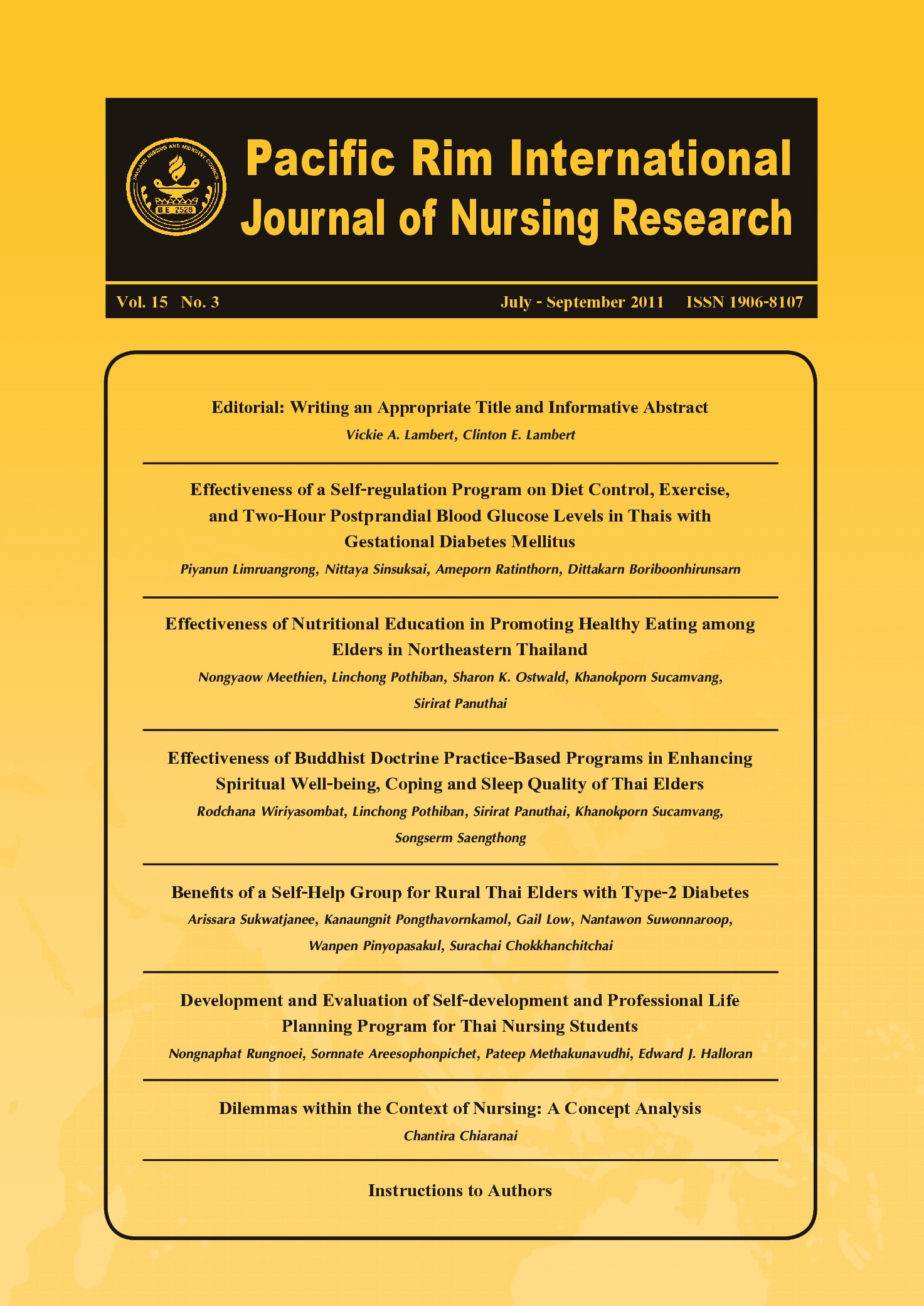Effectiveness of a Self-regulation Program on Diet Control, Exercise, and Two-Hour Postprandial Blood Glucose Levels in Thais with Gestational Diabetes Mellitus
Keywords:
การกำกับตนเอง, อาหาร, ออกกำลังกาย, ระดับน้ำตาลในเลือด, สตรีที่เป็นเบาหวาน, ขณะตั้งครรภ์, Self-regulation, Diet, Exercise, Blood Glucose, Gestational diabetes mellituAbstract
บทคัดย่อ
การศึกษานี้ใช้ทฤษฎีการเรียนรู้ทางสังคมเชิงพุทธิปัญญาของแบนดูรามาเป็นกรอบ แนวคิดในการศึกษา เพื่อศึกษาประสิทธิผลของโปรแกรมการกำกับตนเองต่อพฤติกรรมการ รับประทานอาหาร การออกกำลังกาย และระดับน้ำตาลในเลือดหลังรับประทานอาหาร 2 ชั่วโมง ในสตรีไทยที่เป็นเบาหวานขณะตั้งครรภ์ กลุ่มตัวอย่างจำนวน 90 ราย แบ่งเป็นกลุ่มทดลอง และกลุ่มควบคุม กลุ่มละ 45 ราย ทั้งสองกลุ่มได้รับการสอนเรื่องการควบคุมอาหาร, การออกกำลังกาย และได้รับการ ดูแลตามปกติจากโรงพยาบาลที่ไปฝากครรภ์ แต่กลุ่มทดลองได้รับโปรแกรมการกำกับตนเองร่วมด้วย เก็บรวบรวมข้อมูลด้วยเครื่องมือ แบบสอบถามข้อมูลส่วนบุคคล, แบบบันทึกการรับประทานอาหาร, แบบบันทึกการออกกำลังกาย และระดับน้ำตาลในเลือดหลังรับประทานอาหาร 2 ชั่วโมง
ผลการทดสอบไคสแควร์พบว่าอัตราส่วนของกลุ่มตัวอย่างในกลุ่มทดลองสามารถควบคุม อาหาร, ออกกำลังกาย และระดับน้ำตาลในเลือดหลังรับประทานอาหาร 2 ชั่วโมงมากกว่ากลุ่มควบคุม ภายหลังเข้าโปรแกรมในสัปดาห์ที่ 2, 4 และ 6 อย่างมีนัยสำคัญทางสถิติ นอกจากนี้จากการวิเคราะห์ด้วย ความเสี่ยงสัมพัทธ์พบว่า กลุ่มทดลองสามารถควบคุมอาหาร ออกกำลังกาย และระดับน้ำตาลในเลือด หลังรับประทานอาหาร 2 ชั่วโมงได้ดีกว่ากลุ่มควบคุม ภายหลังเข้าโปรแกรมในสัปดาห์ที่ 2, 4 และ 6
การศึกษาครั้งนี้พบว่า โปรแกรมการกำกับตนเองช่วยสนับสนุนให้กลุ่มตัวอย่างในกลุ่มทดลอง สามารถควบคุมอาหาร ออกกำลังกาย และระดับน้ำตาลในเลือดหลังรับประทานอาหาร 2 ชั่วโมงได้ อย่างมีประสิทธิภาพ
คำสำคัญ : การกำกับตนเอง, อาหาร, ออกกำลังกาย, ระดับน้ำตาลในเลือด, สตรีที่เป็นเบาหวาน, ขณะตั้งครรภ์
Abstract
This study, using Bandura’s Social Cognitive Theory as a framework, tested the effectiveness of a self-regulation program on diet control, exercise and two-hour postprandial blood glucose levels in Thais with gestational diabetes mellitus. Ninety participants were equally divided into an experimental (n = 45) and a control group (n = 45). Both groups were instructed in dietary control and exercise, and received routine care at their respective antenatal clinics. The experimental group members also were trained in self-regulation skills. Instruments for data collection included the: a) Personal Information Questionnaire, and b) Daily Diet Control, Exercise and Two-hour Postprandial Blood Glucose Record Sheet.
The Chi-square test revealed the rate at which the experimental group subjects controlled their diet, exercise and two-hour postprandial blood glucose levels, at weeks two, four and six of the program, to be significantly greater than in the control group. Moreover, relative risk analysis (risk ratio) showed the subjects, in the experimental group, could control their diet, exercise and two-hour postprandial blood glucose levels better than those in the control group at weeks two, four and six of the program. These findings illustrate the self-regulation program was effective in helping the experimental group subjects control their diets, exercise and blood glucose levels.
Keywords : Self-regulation, Diet, Exercise, Blood Glucose, Gestational diabetes mellitu
Downloads
How to Cite
Issue
Section
License
Copyright: The Pacific Rim International Journal of Nursing Research, Thailand Nursing & Midwifery Council has exclusive rights to publish, reproduce and distribute the manuscript and all contents therein.








.png)



